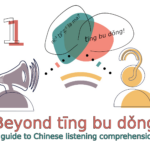Articles in the ‘Immersion and integration’ category Page 3
-
Why travelling isn’t the best method to learn Chinese
Travelling is often touted as one of the best ways to learn a language, but is it really? What are some downsides of travelling to learn Chinese, and how should you travel to get the most out of it?
Read → -
Beyond tīng bu dǒng, part 5: Becoming a better listener as a student of Chinese
Many things influence listening comprehension in Chinese, some are related to the language, and some to the situation, but some are also related to you as a listener. How can you become a better listener in Mandarin?
Read → -
6 benefits of learning Chinese through sports
The general benefits of physical activity are well-known, but the more specific benefits for learning languages are often overlooked, so let’s have a look at 6 benefits of learning Chinese through sports!
Read → -
Beginner Chinese listening practice: What to listen to and how
The best way to learn to understand spoken Mandarin is to listen as much as you can to engaging content you can make sense of without looking things up. In this article, I go through the best types of beginner Chinese listening practice!
Read → -
Beyond tīng bu dǒng, part 3: Using what you already know to aid listening comprehension in Chinese
Listening comprehension is not only about extracting information from the spoken Mandarin you hear, it’s also about applying what you already know and expect.
Read → -
Standard pronunciation in Chinese and why you want it
What should you learn if your friends and your teacher tell you different things? How should you navigate the space between standard pronunciation and regional accents? Standard pronunciation will help you communicate, but a regional accent might help you fit in.
Read → -
The 10 best free Chinese listening resources for beginner, intermediate and advanced learners
Listening is the most important skill of all, because it accelerates all other learning and is crucial for social integration. What are the best free Chinese listening resources out there for beginner, intermediate and advanced learners?
Read → -
Beyond tīng bu dǒng, part 2: From sound to meaning in Mandarin
Listening comprehension in Mandarin is complex, and the more I learn about it, the more amazing it seems that we’re able to understand anything at all.
Read → -
Beyond tīng bu dǒng, part 1: A guide to Chinese listening comprehension
Listening comprehension is essential when learning Chinese, but if we want to improve, we need to move beyond tīng bu dǒng and identify what the problem really is.
Read → -
Analyse and balance your Chinese learning with Paul Nation’s four strands
When learning Chinese, it’s hard to make sure you’re doing the right things. Paul Nation’s four strands allow you analyse and balance your learning!
Read →









